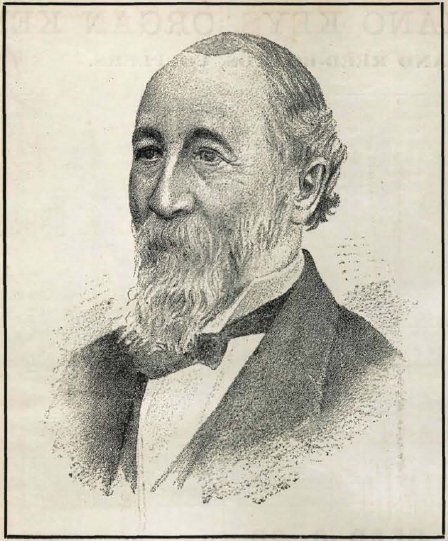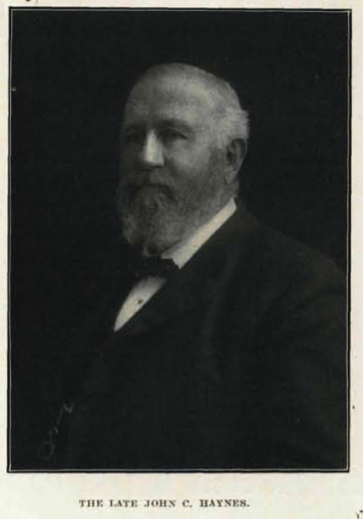| A Brief History of the Bay State Guitar
Bay State was the brand name of high end acoustic guitars created by the John C. Haynes Company, which was founded in 1865 in Boston, Massachusetts.
The story of Bay State instruments is really the story of John C. Haynes. He was born in Boston in 1829, and in 1848, entered the employ of Oliver Ditson, a music publisher, as an errand boy. Six years later Mr. Ditson, who was so impressed with the brightness of young Haynes, advanced him materially, and in 1857, Mr. Haynes became a junior, and at that time, the only partner of Oliver Ditson & Co.

Oliver Ditson (Music Trade Review 1889)

John C. Haynes taken in the early 1900’s - Music Trade Review.
In 1861 the firm of Oliver Ditson & Co. bought a bankrupt stock of musical instruments. There was no room in the Ditson store to accommodate this large stock, the purchase of which marked a new departure for the firm which was predominantly selling sheet music.
It was thought unwise to have two stores in the same city with the same name so a new store was rented to house and sell the instruments and, since it was run by Ditson’s new partner, it was named John C. Haynes & Co. Although a separate company it was always a department of the Ditson house. John C. Haynes & Co.was eventually amalgamated with The Oliver Ditson Co. (which by then had changed the name from Oliver Ditson & Co.) at the end of 1903.
Soon after buying this bankrupt stock and moving into the new premises, John C. Haynes & Co. began making instruments, with 1865 generally attributed to the commencement of production. Initially Haynes started making 'Tilton Improvement' guitars under license and also their own 'Excelsior' Label. The 'Bay State' and 'Hub' labels do not appear to have come into production until the latter part of the 1880's (see the Registry page). The Bay State brand being named in honor of the Commonwealth of Massachusetts.
For 40 years the Haynes Company produced large numbers of quality guitars, banjos, mandolins, zithers and flutes under the Bay State, Excelsior and Tilton labels. Towards the end of the 19th century Haynes also produced, or bought and re-branded, brass band instruments.
Haynes chief luthier was Pehr A. Anderberg, a Swedish immigrant who came to America during the Civil War, worked in New York City, and later (circa 1880) moved to Somerville, near Boston. He began making guitars exclusively for the John C. Haynes Company in a shop on Fremont Street. This shop became a training ground for several extremely talented musical instrument makers, including Swedish born Julius Nelson, his brother Carl, and a group of associates including C.A. Sundberg, John Pahn and Johyn Swenson who ultimately founded the Vega Banjo Company. However, it was Anderberg who supervised the actual construction of all the Haynes brand instruments, including the Bay State brand. During this period Julius Nelson served as shop foreman of guitar and mandolin manufacturing at Anderberg’s shop. Together they created some of the finest early American guitars.
At some point around 1890, John C. Haynes & Co. bought Anderberg out and took charge of Anderberg's guitar operation. At that time the factory employed about twenty five men, first on Sudbury St., opposite Court St., then at 72 Purchase St. and later on Stanhope St. Pehr Anderberg left the John C. Haynes Company in 1892 and continued to make guitars on his own in Chelsea, MA. His guitars were called "Pullmann" and are quite rare. Pehr Anderberg died February 9, 1932.
Bay State guitars from that era are known for their fine wood and intricate inlays and bridges although Bay State also constructed plain unadorned instruments. All guitars were gut string since steel strings were not widely known or used until the 1920’s. It was also an era before truss rods or any kind of neck reinforcements. The death of the founder of the business, Oliver Ditson, in 1888, led to the formation of a corporation, consisting of the remaining partners of Oliver Ditson and the executors of the Ditson estate. This corporation was known as the Oliver Ditson Co., and John C. Haynes was its president for many years. It is reported that he was a man who was intelligent and energetic, with a keen appreciation of humor.
Effectively John C. Haynes successfully controlled the destinies of both the Oliver Ditson Co. and John C. Haynes and Co. until the end of 1903, when, at the age of 74, he retired. As mentioned previously the company bearing his name was then consolidated into the Ditson company. The production of all instruments, including Bay State, ceased shortly after, and the facility was sold to Vega Banjo.
John C. Haynes died a wealthy man in 1907 at the age of 78. He was believed to be worth nearly $4,000,000, a fortune in 1907, and he left $56,000 to charities and public institutions. The first era of the Bay State guitar had come to an end.
John C. Haynes and the Bay State Guitar Company published many catalogs during their existence. We are attempting to compile as many as possible to be able to correlate all of the styles and serial numbers we receive. If you have any Haynes catalogs we would very much like to hear from you!
The importance and historical significance of the John C. Haynes Company and its parent company, the Oliver Ditson Co., on the development of musical tastes and expectations of the American people in all things "guitar" should not be underestimated. They were arguably the first manufacturer of stringed instruments producing significant numbers for the general population (C.F. Martin and Co., while established in 1833, did not start producing large numbers of instruments until the 1890’s, and it appears their total production from 1833 to 1900 was around 10,000 guitars. This compares to approximately 30,000 guitars produced by the Haynes company from 1865 to 1903).
Many significant personalities who influenced the developing music industry started work with John Haynes including P. J. Healy and George Washburn Lyon. Oliver Ditson helped them set up their firm of Lyon & Healy in Chicago in 1864. The John Church Company was also a Ditson offshoot and as mentioned many important and talented luthiers learnt their trade under the guidance of Pehr Anderberg making Bay State guitars.
Haynes/Ditson and Bay State Guitars were the start of the guitar as the 'peoples musical instrument' and the forerunner of the many Chicago makers of the early 20th century.
(Some of the information for this article is from the Music Trade Review 1880 – 1927 courtesy KLOV.com at http://mtr.arcade-museum.com/)
If you own a Vintage Bay State Guitar - please go to our REGISTRY page (click here) and consider registering the Style and Serial Number!
Back to "About Us" | 



